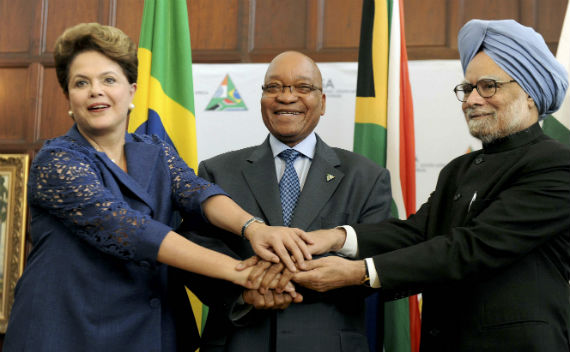More on "Going It Alone": India and Internet Governance
More on:

I’ll go ahead and jump in late to the discussion Liz and Evan were having about India’s foreign policy. Despite their different focus, they do seem to converge around the point that India now frequently charts its own course, in some instances moving closer to the United States, in others China, and in some cases remaining distant from both and finding other partners.
A recent declaration about the need for a new organization, within the United Nations framework, to oversee global Internet governance highlights how India is trying to walk that tightrope. At first glance, the declaration, which was made at the end of the fifth IBSA (India, Brazil, South Africa) summit in Pretoria, seems harmless enough. The Internet is clearly a global issue lacking an effective governance mechanism. Moreover, as emerging economies, India, Brazil, and South Africa tend to see the current structure as dominated by the United States and American companies. The Hindu quoted the head of an Indian NGO: “Internet-related policies today are made either by mega global digital corporations or directly by pluri-lateral bodies of the rich nations, like the Organisation for Economic Cooperation and Development.”
Yet, the call for the United Nations or another state-centric organization to play a larger role in Internet governance makes most nongovernmental organizations nervous. As Milton Mueller, a professor at Syracuse University School of Information notes: “The UN is an intergovernmental forum organized around nation-states. It is designed to empower and represent governments, not a transnational community." Moreover, on this issue, the IBSA declaration allies India with China and Russia which also want to see the UN play a greater role in Internet governance. The proposed International Code of Conduct for Information Security, which China and Russia submitted at the 66th session of the General Assembly, “underlin[es] the need for enhanced coordination and cooperation among States” and “stress[es] the role that can be played by the United Nations and other international and regional organizations.”
These are probably not the bedfellows these three multiethnic and multicultural democracies want to have when it comes to issues of freedom of information in cyberspace, and so India has stressed that any organization should be “transparent, democratic, with multiple stakeholders and multilateral.” The Indian representative to the Internet Governance Forum also stressed that these recommendations were preliminary, meant as a starting point for discussion.
At the London Conference on Cyberspace next week, the United States will be looking for "like-minded" countries to help define the norms of responsible state behavior. India, with its democratic system and concerns about Chinese hacking, is a natural partner. But Washington will also be reminded that Delhi has its own concerns and a range of other states it can collaborate with.
More on:
 Online Store
Online Store
